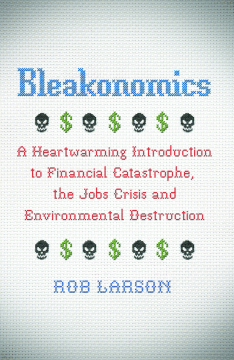
Additional Information
Book Details
Abstract
This is a darkly humorous guide to the three great crises plaguing today's world: environmental degradation, social conflict in the age of austerity and financial instability.
Rob Larson holds mainstream economic theory up against the grim reality of a planet in meltdown. He looks at scientists’ conclusions about climate change, the business world’s opinions about its own power, and reveals the fingerprints of finance on American elections.
Through ascerbic analysis, Bleakonomics unveils a world of extreme inequality, confusion and insanity.
'A most valuable contribution to public understanding and vitally needed action'
Noam Chomsky
'Whether illuminating the rapacious class war being waged by America's CEOs, the remarkably mindless degradation of the world's oceans, or the wishful thinking about the increasingly evident consequences of global warming, Rob Larson consistently brings powerful insights and a biting wit. Larson has a unique skill for translating complex economic and scientific analysis with both clarity and force'
Roger Bybee, labour journalist
'Robert Larson's range of topics and accessible writing make this book an invaluable contribution to the critical task of connecting environmental degradation and overwhelming corporate power'
Mary Zepernick, co-founder of Program on Corporations, Law, and Democracy (POCLAD)
'Larson adds a critical component to the policy debate about financial reform by explaining why the systemically dangerous institutions (SDIs) -- the 'too big to fail' banks -- imperil our democracy as well as our economy'
William K. Black, Associate Professor of Economics and Law, University of Missouri-Kansas City, author of The Best Way to Rob a Bank is to Own One.
'Fact-driven, concise, interesting, and even funny -- that's unusual for a book about economics, policies, and working people'
Tom Szymanski, Organizer of IBEW Local 275
Table of Contents
| Section Title | Page | Action | Price |
|---|---|---|---|
| Cover | Cover | ||
| Contents | v | ||
| Preface: The Plutonomy Papers | vii | ||
| Acknowledgements | xi | ||
| Part I: External Damnation: The Market's Unintended Impact on the Environment | 1 | ||
| Introduction to Part I: \"Externalities\" in Theory | 3 | ||
| 1. Come Hell and High Water: Scientists Indict Capitalism | 6 | ||
| 2. Hug Them While They Last: Costs Beyond the Pump | 17 | ||
| 3. Hot Water: Capitalism's \"Best Economic Case | 27 | ||
| 4. The Brown Peril: Atmospheric Brown Clouds and Asian Neoliberalism | 40 | ||
| 5. Cause and Side-effect: Big Picture Externalities | 52 | ||
| 6. As Not Seen on TV: The Market and the Media | 60 | ||
| Part II: Will Work for Peanuts: The Job Market and the War on Labor | 69 | ||
| Introduction to Part II: The Labor Market in Theory | 71 | ||
| 7. Classroots: \"Run-of-the-mill Class Conflict | 74 | ||
| 8. Hitting the Class Ceiling: The Modern Practice of Class Confrontation | 82 | ||
| 9. Fight and Flight: Economic Conflict, Past and Present | 94 | ||
| 10. Mideast Meets Midwest: Labor Uprisings of 2011 | 101 | ||
| 11. Shortchange You Can Believe In: The Obama Administration and Neoliberalism | 111 | ||
| 12. The Subprime Court: The Corporate Lock on the Roberts Court | 125 | ||
| 13. Keeping Down with the Joneses: American Survival Strategies | 135 | ||
| Part III: The Invisible Hand Gives the Finger: The Crisis-prone Finance Market | 141 | ||
| Introduction to Part III: Credit Markets in Theory | 143 | ||
| 14. Pop Goes the Economy: The Origin of Financial Bubbles | 146 | ||
| 15. Not Too Big Enough: How America's Banks Got Too Big to Fail | 153 | ||
| 16. Bonanzas as Usual: How Sky-high Bank Profits Persist Despite Bad Loans | 164 | ||
| 17. Fed Up: The Desperation of Quantitative Easing | 175 | ||
| 18. Starved for Attention: Financial Speculation and Rising Food Prices | 185 | ||
| Conclusion: Invisible Sleight-of-hand: Economics as a Failed Science | 194 | ||
| Notes | 209 | ||
| Index | 232 |
